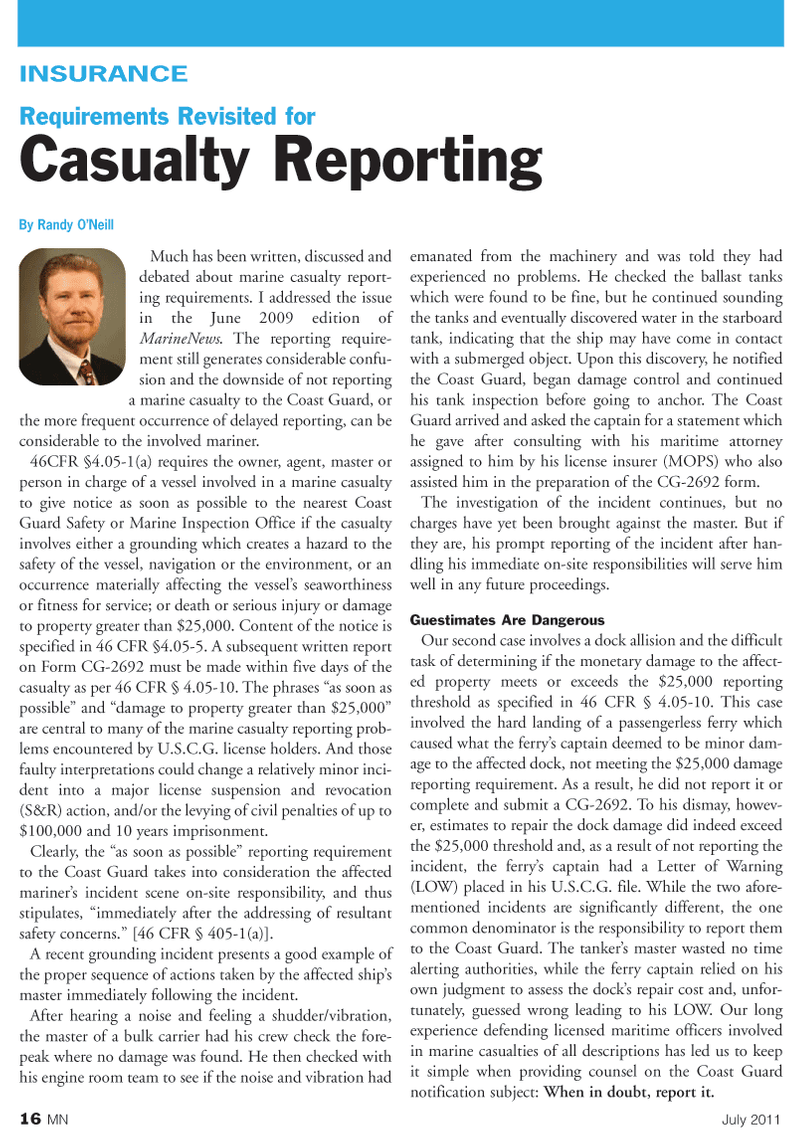
Page 16: of Marine News Magazine (July 2011)
Workboat Power
Read this page in Pdf, Flash or Html5 edition of July 2011 Marine News Magazine
16MNJuly 2011INSURANCEMuch has been written, discussed and debated about marine casualty report- ing requirements. I addressed the issue in the June 2009 edition of MarineNews . The reporting require- ment still generates considerable confu-sion and the downside of not reporting a marine casualty to the Coast Guard, or the more frequent occurrence of delayed reporting, can be considerable to the involved mariner. 46CFR §4.05-1(a) requires the owner, agent, master or person in charge of a vessel involved in a marine casualty to give notice as soon as possible to the nearest Coast Guard Safety or Marine Inspection Office if the casualty involves either a grounding which creates a hazard to the safety of the vessel, navigation or the environment, or an occurrence materially affecting the vessels seaworthiness or fitness for service; or death or serious injury or damage to property greater than $25,000. Content of the notice is specified in 46 CFR §4.05-5. A subsequent written report on Form CG-2692 must be made within five days of the casualty as per 46 CFR § 4.05-10. The phrases as soon as possible? and damage to property greater than $25,000? are central to many of the marine casualty reporting prob- lems encountered by U.S.C.G. license holders. And those faulty interpretations could change a relatively minor inci- dent into a major license suspension and revocation (S&R) action, and/or the levying of civil penalties of up to$100,000 and 10 years imprisonment. Clearly, the as soon as possible? reporting requirement to the Coast Guard takes into consideration the affected mariners incident scene on-site responsibility, and thus stipulates, immediately after the addressing of resultant safety concerns.? [46 CFR § 405-1(a)].A recent grounding incident presents a good example of the proper sequence of actions taken by the affected ships master immediately following the incident. After hearing a noise and feeling a shudder/vibration,the master of a bulk carrier had his crew check the fore- peak where no damage was found. He then checked with his engine room team to see if the noise and vibration had emanated from the machinery and was told they had experienced no problems. He checked the ballast tanks which were found to be fine, but he continued sounding the tanks and eventually discovered water in the starboard tank, indicating that the ship may have come in contact with a submerged object. Upon this discovery, he notified the Coast Guard, began damage control and continued his tank inspection before going to anchor. The Coast Guard arrived and asked the captain for a statement which he gave after consulting with his maritime attorney assigned to him by his license insurer (MOPS) who also assisted him in the preparation of the CG-2692 form. The investigation of the incident continues, but no charges have yet been brought against the master. But if they are, his prompt reporting of the incident after han- dling his immediate on-site responsibilities will serve him well in any future proceedings. Guestimates Are Dangerous Our second case involves a dock allision and the difficult task of determining if the monetary damage to the affect- ed property meets or exceeds the $25,000 reporting threshold as specified in 46 CFR § 4.05-10. This case involved the hard landing of a passengerless ferry which caused what the ferrys captain deemed to be minor dam- age to the affected dock, not meeting the $25,000 damagereporting requirement. As a result, he did not report it or complete and submit a CG-2692. To his dismay, howev- er, estimates to repair the dock damage did indeed exceed the $25,000 threshold and, as a result of not reporting the incident, the ferrys captain had a Letter of Warning (LOW) placed in his U.S.C.G. file. While the two afore- mentioned incidents are significantly different, the one common denominator is the responsibility to report them to the Coast Guard. The tankers master wasted no time alerting authorities, while the ferry captain relied on his own judgment to assess the docks repair cost and, unfor- tunately, guessed wrong leading to his LOW. Our long experience defending licensed maritime officers involved in marine casualties of all descriptions has led us to keepit simple when providing counsel on the Coast Guard notification subject: When in doubt, report it. Requirements Revisited for Casualty Reporting By Randy ONeill

 15
15

 17
17
